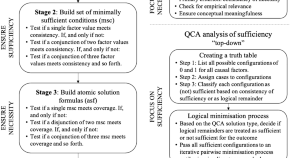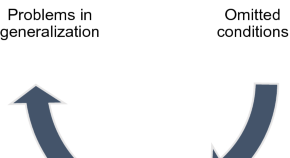
Collection
Causation, inferences, and solution types in configurational comparative methods
- Submission status
- Closed
This special issue addresses questions of causality and validity of different solution types in configurational comparative methods (CCMs). First, what main parameters characterize the debate about correct causal interpretation of solution types? Second, to what extent has this debate been linked to a theory of causation. CCMs such as qualitative comparative analysis (QCA) (Ragin 1987/2014) and Coincidence Analysis (CNA) (Baumgartner 2009), have developed into respected methods in the social sciences. The results of both QCA and CNA can be interpreted in terms of sufficiency and necessity and are used for drawing causal inferences. Nevertheless, QCA and CNA use a different analytical approach to produce solutions and suggest different criteria for assessing their validity. While CNA only produces one solution type for each outcome, in the presence of limited empirical diversity, several different solution types can be derived in QCA: conservative, (enhanced) intermediate, and (enhanced) parsimonious solutions (see Oana et al. 2021).
The special issue contribution by Mahoney and Acosta bases qualitative comparative analysis (QCA) within a regularity theory of causation integrating type-level inferences and counterfactual cases. Swiatczak clarifies how the different algorithms underlying QCA and Coincidence Analysis (CNA) produce non-identical models. Baumgartner defines and benchmarks QCA solution types against the search target of minimal robust sufficiency. Alamos-Concha et al. identify the conservative solution as most appropriate for a multimethod design combining a counterfactual causal understanding at the cross-case level with an in-depth mechanistic explanation at the within-case level. Finally, Mahoney and Owen develop a general set-theoretic framework for the study of necessity and sufficiency in quantitative research using a counterfactual understanding of causality. Our introduction reviews the state of the art, identifies current limitations and open questions regarding the theoretical basis for causal interpretation of QCA solutions.
Editors
-
Tim Haesebrouck
Ghent University, Belgium I am a post-doctoral researcher the Institute for International and European Studies of Ghent University, Belgium. Empirically, my research focusses on military intervention, defence policy, small states, foreign policy analysis and foreign policy change. In addition, I have a strong interest in the development of configurational comparative methods (CCMs) like Qualitative Comparative Analysis. My work has been published in Journal of Peace Research, Journal of Conflict Resolution, Foreign Policy Analysis, Contemporary Security Policy and Cambridge Review of International Affairs.
-
Eva Thomann
University of Konstanz, Germany I am a full professor of Public Administration at the Department of Politics and Public Administration at the University of Konstanz, Germany. I have previously held research and visiting positions at the Universities of Bern, Heidelberg, and Exeter and at the European University Institute in Florence. I hold a Masters degree in Political Science from the University of Zurich and a PhD in Public Administration from the University of Bern. Much of my research focuses on the patterns, reasons and consequences of how policies are put into practice.
Articles (6 in this collection)
-

-
Conservative solutions for progress: on solution types when combining QCA with in-depth Process-Tracing
Authors (first, second and last of 6)
- Priscilla Álamos-Concha
- Valérie Pattyn
- Bart Cambré
- Content type: OriginalPaper
- Open Access
- Published: 03 August 2021
- Pages: 1965 - 1997

-
Introduction: Causation, inferences, and solution types in configurational comparative methods
Authors
- Tim Haesebrouck
- Eva Thomann
- Content type: EditorialNotes
- Published: 29 July 2021
- Pages: 1867 - 1888
-
A regularity theory of causality for the social sciences
Authors
- James Mahoney
- Laura Acosta
- Content type: OriginalPaper
- Published: 17 July 2021
- Pages: 1889 - 1911
-
Importing set-theoretic tools into quantitative research: the case of necessary and sufficient conditions
Authors
- James Mahoney
- Andrew Owen
- Content type: OriginalPaper
- Published: 16 July 2021
- Pages: 2001 - 2022

-
Qualitative Comparative Analysis and robust sufficiency
Authors
- Michael Baumgartner
- Content type: OriginalPaper
- Open Access
- Published: 23 June 2021
- Pages: 1939 - 1963



